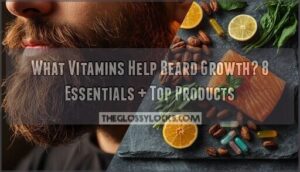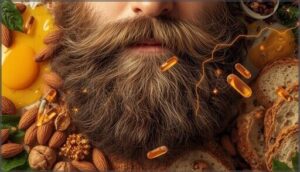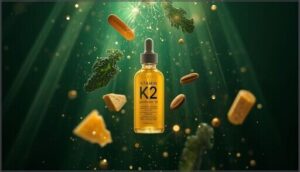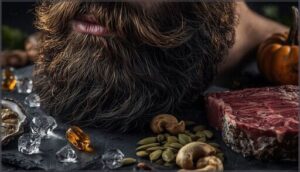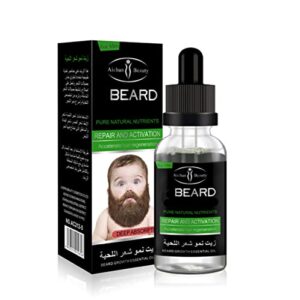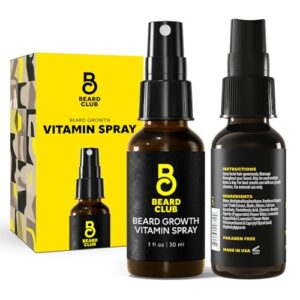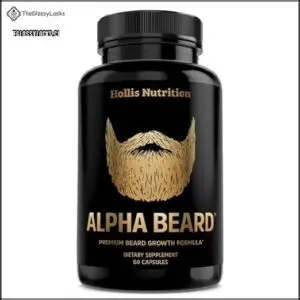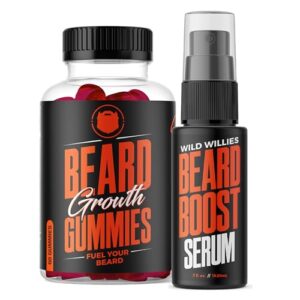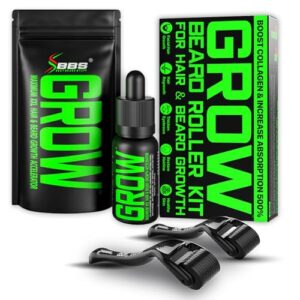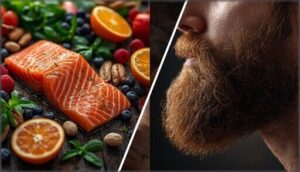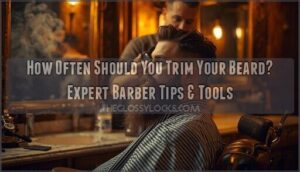This site is supported by our readers. We may earn a commission, at no cost to you, if you purchase through links.
Your beard’s potential isn’t just locked in your DNA—it’s waiting in your bloodstream. The follicles dotting your jawline are microscopic factories running 24/7, and like any factory, they need specific raw materials to produce thick, healthy hair. Miss those key nutrients and you’re basically asking your face to build a mansion with half the lumber.
Biotin, vitamin D, zinc, and a handful of other essentials act as the construction crew, orchestrating everything from keratin synthesis to follicle health.
The good news? You don’t need to play nutritional detective or resort to sketchy “miracle” serums. Science has mapped out exactly what vitamins help beard growth, and the results are backed by dermatological research, not marketing hype.
Table Of Contents
- Key Takeaways
- Essential Vitamins That Support Beard Growth
- Top Beard Growth Products With Vital Vitamins
- How Nutrition and Diet Affect Beard Growth
- Lifestyle Tips to Maximize Beard Vitamin Benefits
- Frequently Asked Questions (FAQs)
- What is the best vitamin for beard growth?
- Which vitamin is used to grow a beard?
- Does B12 grow a beard?
- What vitamins help a beard grow?
- Does castor oil help with the growth of a beard?
- Does vitamin D promote beard growth?
- Why is vitamin C important for beard growth?
- Does B12 help beard growth?
- Do beard growth vitamins actually work?
- How can I stimulate my beard growth?
- Conclusion
Key Takeaways
- Your beard follicles need specific raw materials—biotin, vitamin D, zinc, and vitamins A, C, E, and K2—to produce thick, healthy hair through keratin synthesis and proper follicle function, and deficiencies in these nutrients directly stall growth regardless of topical products.
- Biotin (2–5 mg daily) turbocharges keratin production and reduces breakage, while vitamin D (600–2,000 IU) activates follicle growth cycles and vitamin A (900 mcg) regulates sebum production—these three form the core nutritional foundation your beard can’t thrive without.
- Diet matters more than you think: 85% of each hair strand is keratin built from dietary protein, so hitting 0.8g per kg body weight daily plus loading up on eggs, salmon, almonds, and sweet potatoes delivers the amino acids and vitamins your follicles demand.
- Supplements and serums only optimize what your genetics already allow—they won’t create new follicles or override hormonal limitations, but when combined with proper sleep (7–9 hours for growth hormone surges), exercise (for nutrient delivery), and stress management (to control cortisol), they maximize your beard’s natural potential.
Essential Vitamins That Support Beard Growth
Your beard isn’t just going to grow itself into Viking glory—it needs the right fuel. Think of vitamins as the behind-the-scenes crew that keeps your follicles fired up, your skin healthy, and your hormones in check.
If you’re serious about leveling up your beard game, stocking up on essential vitamins for beard health is the smartest first move you can make.
Here are the eight essential vitamins that’ll transform your patchy situation into something you’ll actually want to show off.
Biotin for Thicker, Fuller Beard Hair
Biotin turbocharges keratin production, the protein backbone of every beard hair you’re growing. When your follicles get enough, breakage drops and thickness climbs—especially if you’ve been running low.
- Eggs, nuts, and whole grains deliver natural biotin hits
- Daily doses of 2-5 mg support keratin without toxicity risk
- Deficiency shows up as brittle, thinning facial hair
- Results take weeks, not days, so patience pays off
You can learn more about the importance of and how it fits into a complete beard care strategy.
Vitamin D for Hair Follicle Health
Your follicles actually need functional vitamin D receptors to cycle through active growth phases—without them, beard growth stalls and shedding spikes. Low levels disrupt follicle regeneration and inflammation control, so aim for 600–2,000 IU daily or get smart about sun exposure.
Blood work can confirm deficiency effects before you waste time guessing. Hair growth responds when you fix the deficit.
People experiencing unexplained hair loss may benefit from learning about the connection between vitamin D deficiency.
Vitamin a for Skin and Sebum Production
You need vitamin A to regulate skin barrier integrity and sebum balance—without it, follicles suffocate under dry, flaky buildup. Vitamin A deficiency tanks skin renewal cycles and oil production, while retinoid therapy restores follicular health. Aim for 900 mcg daily from liver, eggs, or orange veggies.
Combining vitamins for beard growth with proper nutrition and wellness beats random supplementation every time.
Vitamin E for Antioxidant Protection
Your beard follicles live under relentless oxidative stress from UV rays, pollution, and metabolic byproducts—vitamin E benefits your facial hair by neutralizing free radical damage before it degrades cell membranes. Alpha-tocopherol delivers antioxidant defense that shields skin protection mechanisms and sebaceous glands.
Get 15 mg daily from almonds, sunflower seeds, or spinach. Antioxidants and beard growth vitamins work synergistically when you prioritize nutrition and wellness over hype.
Vitamin C for Collagen and Skin Support
Strong collagen production transforms patchy whiskers into dense facial armor. Vitamin C benefits your beard by activating hydroxylase enzymes that stabilize collagen’s triple helix structure beneath every follicle. This antioxidant effect shields skin health while accelerating collagen remodeling to keep facial hair care anchored in firm dermal scaffolding.
Grab 90 mg daily from citrus, bell peppers, or kale for skin firming beard growth wins.
B Vitamins for Keratin and Growth
Your beard’s keratin production depends on a full B-complex squad. Biotin benefits shine through thicker strands, while riboflavin fuels follicle energy and niacin effects boost circulation. Pantothenic acid strengthens hair shafts, folate supplements support cell division, and vitamin B6 aids protein metabolism.
Pairing these vitamins with healthy beard growth habits like proper hydration ensures nutrients reach every follicle efficiently.
Together, these beard growth vitamins power keratin synthesis—grab vitamin supplements or load up on eggs, nuts, and whole grains.
Vitamin K2 for Hormonal Balance
Balance is everything regarding hormone regulation and beard growth. Vitamin K2—especially the MK-7 form—assists endocrine support by optimizing calcium balance and working in vitamin synergy with D to fuel bone health and metabolic hormones.
This fat-soluble powerhouse doesn’t act as a hormone itself, but it fine-tunes the mineral pathways your body uses to produce testosterone and maintain steady nutrition for facial hair.
Zinc for Healthy Hair Growth
Zinc is the silent architect behind your beard ambitions. Your hair follicles crave this mineral, not just for producing keratin and strength, but for keeping everything running smoothly. Falling short? Hello, breakage and sluggish growth. Nail your mineral balance and experience:
- Stronger keratin production
- Revved-up hair follicles
- Shield against brittle strands
- Quick recovery from Zinc deficiency setbacks
Let Zinc transform your beard care.
Top Beard Growth Products With Vital Vitamins
You’ve got the vitamin intel—now let’s talk about products that actually deliver those nutrients to your follicles.
I’ve rounded up five solid options that pack the beard-boosting vitamins we just covered, from oils and sprays to supplements and kits. Each one brings something different to the table, so you can find what fits your routine and budget.
1. Aichun Beauty Beard Growth Oil
Looking for a no-minoxidil route to facial hair dominance? Aichun Beauty Beard Growth Oil combines ginger and rosemary oils to wake up those dormant follicles, while grapefruit seed extract and vitamin E nourish each strand.
The 30ml bottle features a dropper for easy daily application—just massage a few drops into your beard and skin post-shower. It’s fast-absorbing, non-greasy, and targets both thickness and that annoying early-growth itch.
Consistency is your ally here; expect visible fullness after several weeks of dedicated use.
| Best For | Guys wanting to fill in patchy spots or boost overall beard thickness without harsh chemicals, especially if you’re early in your growth journey. |
|---|---|
| Form | Oil |
| Key Ingredient | Ginger Oil |
| Application | Topical |
| Target | Beard Growth |
| Scent | Ginger, Rosemary |
| Price Range | Budget |
| Additional Features |
|
- Natural ingredient blend (ginger, rosemary, grapefruit seed oil) nourishes follicles without minoxidil
- Doubles as a styling oil—absorbs quickly, adds shine, and tames itch during the awkward growth phase
- Affordable 30ml size with a dropper makes daily application simple and mess-free
- Results vary widely; some users see zero growth improvement, especially if genetics aren’t on your side
- Requires weeks of consistent use before you’ll notice any real difference in thickness
- May irritate sensitive skin due to potent essential oils like ginger and rosemary
2. Beard Club Biotin Vitamin Spray
Budget-conscious but serious about facial hair? Beard Club’s Biotin Vitamin Spray delivers a targeted blend of biotin, MSM, and nutrients in a mess-free mist—no greasy hands required. At $19.99, you’re getting a fast-acting formula that soothes beard itch while strengthening follicles from the outside in.
The spray mechanism ensures even coverage across patchy zones, and its alcohol-free, paraben-free composition won’t irritate sensitive skin. Apply daily post-shower, and watch thickness creep in over a few committed weeks.
| Best For | Guys who want targeted beard nutrition without the mess of oils or balms, especially if you’re dealing with patchy growth or beard itch. |
|---|---|
| Form | Liquid Spray |
| Key Ingredient | Vitamins & Nutrients |
| Application | Topical Spray |
| Target | Facial Hair Growth |
| Scent | Natural |
| Price Range | Mid-Range ($19.99) |
| Additional Features |
|
- Spray application makes it easy to hit every spot without greasy hands
- Alcohol-free and paraben-free formula won’t dry out or irritate your skin
- Biotin and MSM combo strengthens hair follicles while soothing irritation
- Moisturizing effect fades after 6-8 hours, so you might need to reapply
- Some users report receiving damaged or partially empty bottles
- Scent can be pretty strong in the first hour after spraying
3. Alpha Beard Growth Vitamins Supplement
Want to feed your follicles from the inside out? Alpha Beard Growth Vitamins pack a serious 10,000 mcg biotin punch alongside collagen, keratin, and MSM to fortify each strand from root to tip. The goMCT oil carrier boosts absorption so those nutrients actually reach your facial hair follicles—not just your digestive tract.
Two capsules daily for 30 days, zero greasy mess. Plus, the B-vitamin complex and zinc combo fuels keratin production, giving you the raw materials your beard craves to level up.
| Best For | Men with patchy or slow-growing beards who want a nutrient-dense supplement to support fuller, healthier facial hair without the hassle of topical treatments. |
|---|---|
| Form | Capsules |
| Key Ingredient | Biotin 10,000 MCG |
| Application | Oral Supplement |
| Target | Beard & Hair Growth |
| Scent | Unflavored |
| Price Range | Budget |
| Additional Features |
|
- High-dose biotin (10,000 mcg) plus collagen and keratin deliver comprehensive follicle support in a convenient two-capsule daily dose
- GoMCT oil carrier enhances nutrient absorption so active ingredients actually reach your hair follicles
- Includes DHT blocker (Saw Palmetto) and skin-hydrating ingredients like hyaluronic acid to address multiple aspects of beard health
- Won’t create new follicles if you’re genetically unable to grow a beard—it only optimizes what you’ve got
- Requires consistent daily use for weeks before visible results appear, so patience is essential
- Some users may experience initial breakouts or itchiness as hormones adjust during the early growth phase
4. Wild Willies Beard Growth Serum Kit
When you want a one-two punch—topical serum plus internal supplements—the Wild Willies Dual Threat kit delivers both. The caffeine-spiked Beard Boost Serum juices up blood flow right at your follicles, while the 60-capsule Biositol supplement feeds biotin and vitamins from within.
Toss in a boar bristle brush for even distribution and a travel bag to keep it all wrangled. It’s made in the USA, vegan-friendly, and pairs topical action with nutritional backup for a fuller, thicker beard game.
| Best For | Men with patchy or thin facial hair who want a dual-approach system combining topical application with internal vitamin support. |
|---|---|
| Form | Gummies + Serum |
| Key Ingredient | Biotin & Caffeine |
| Application | Oral + Topical |
| Target | Facial Hair Growth |
| Scent | Unscented |
| Price Range | Mid-Range ($27.99) |
| Additional Features |
|
- Combines both a caffeine-infused serum and biotin supplements to tackle beard growth from the outside and inside
- Includes a boar bristle brush and travel bag for easy application and portability
- Made in the USA with vegan-friendly ingredients at an affordable price point of $27.99
- Results vary widely—some users report minimal improvement in beard thickness or coverage
- High vitamin B6 levels may cause side effects like numbness in fingers or other health concerns with prolonged use
- May accelerate nail growth as an unintended effect, requiring more frequent trimming
5. Beard Growth Oil and Derma Roller Kit
The BBS Best Beard Stuff kit pairs a 540-titanium-needle derma roller (0.25 mm) with their GROW Maximum XXL oil to crack open absorption pathways in your skin. Roll vertical, horizontal, diagonal—then let the castor and jojoba blend sink in deep.
It’s $49.95 for the two-pack, covers all skin types, and helps fill patchy zones while calming itch. Just sanitize with alcohol between sessions, skip active breakouts, and replace needles when they dull.
No follicles? No magic—but existing ones get a serious wake-up call.
| Best For | Guys with patchy beards who want to boost thickness and fill in sparse areas through consistent micro-needling and oil application. |
|---|---|
| Form | Oil + Roller |
| Key Ingredient | Growth Oil |
| Application | Topical + Roller |
| Target | Beard Growth |
| Scent | Not Specified |
| Price Range | Premium ($49.95) |
| Additional Features |
|
- Combines derma roller and growth oil in one kit to maximize follicle stimulation and nutrient absorption
- 540 titanium needles at 0.25 mm work safely on all skin types while reducing itch and irritation
- Two-pack offers good value at $49.95 for targeting multiple problem zones
- Won’t create new hair where follicles don’t exist—genetics still set the limits
- Requires regular cleaning, careful technique, and patience to see results
- Some users report packaging issues like leaks or damaged rollers on arrival
How Nutrition and Diet Affect Beard Growth
You can slather on all the beard oil you want, but if your diet’s a disaster, your follicles won’t have the raw materials they need to build thick, healthy hair. What you eat directly impacts keratin synthesis, hormone production, and the cellular mechanisms that determine whether your beard thrives or just limps along.
Let’s break down exactly how your nutrition fuels facial hair growth and what dietary moves actually make a difference.
Protein Intake for Hair Structure
Your beard is literally built from protein—about 85 percent of each hair strand is keratin made from dietary amino acids.
That means hitting around 0.8 grams per kilogram of body weight daily keeps follicles fed and ready to push out thicker, stronger hairs.
Spread your protein across meals, lean into complete sources like eggs and fish, and watch your beard fill in with real structural integrity.
Foods Rich in Key Beard Vitamins
Stack your plate with eggs and almonds for biotin—you’re looking at 30 micrograms per egg and a solid microgram per ounce of nuts. Salmon and fortified dairy deliver 600 to 800 IU of vitamin D, while sweet potatoes clock in at 450 micrograms of vitamin A per half cup.
These vitamin-rich foods fuel a healthy beard diet and keep nutrition working for your face.
Hydration for Follicle Strength
Drinking enough water isn’t sexy, but it’s clutch for follicle health and beard growth. Proper fluid balance keeps blood flowing to your scalp, delivering biotin and vitamins straight to the hair roots.
Hydration benefits include stronger follicle stimulation, better scalp care, and improved sebum production. Aim for steady water intake throughout the day—your follicles depend on it for resilient, thicker growth.
Limiting Processed Foods for Optimal Growth
Cut the ultra-processed junk, and your beard will thank you. Excess sodium spikes blood pressure, limiting nutrient delivery to follicles, while hidden sugars trigger hormonal chaos.
Swap ready-made meals for whole food benefits—lean proteins, dark greens, and healthy fats loaded with zinc and iron. Your balanced diet becomes your secret weapon, fueling vitamins for beard growth from the inside out.
Lifestyle Tips to Maximize Beard Vitamin Benefits
Taking beard vitamins is just the start—you’ve got to create the right environment for those nutrients to actually work their magic. Your daily habits, from how much you move to how well you sleep, directly impact whether those vitamins make it to your follicles and do their job.
Let’s break down the lifestyle tweaks that’ll turn your supplement routine from mediocre to beard-building gold.
Exercise for Improved Nutrient Delivery
Want a beard that actually thrives? Get moving. Exercise boosts blood flow and delivers vitamins straight to your follicles, making every supplement you take work harder.
Aerobic benefits and muscle stimulation ramp up vascular health, pushing nutrients deep into your skin.
Plus, exercise nutrition uptake skyrockets post-workout, so those beard growth essentials hit where they’re needed most.
Sleep for Hormone Regulation
Your sleep patterns control the hormone balance that fuels beard growth—period. During deep sleep, growth hormone surges while cortisol management keeps testosterone levels steady. Melatonin levels rise in darkness, syncing growth regulation with your body’s natural rhythms.
Deep sleep fuels beard growth by surging growth hormone, steadying testosterone, and syncing melatonin with your body’s natural rhythms
Skimp on rest and you’ll tank the very hormones your beard needs, even if you’re crushing vitamin D and supplements. Get those seven to nine hours.
Stress Management for Growth Support
High cortisol levels sabotage your beard growth by suppressing testosterone and choking nutrient delivery to follicles.
Mindful breathing and relaxation techniques lower stress hormones while boosting emotional balance—think ten-minute daily sessions that recalibrate your nervous system.
Mental wellness isn’t separate from men’s health; it’s the foundation. Combine stress reduction with your vitamins and supplements for real beard growth support, not just wishful thinking.
Daily Beard and Skin Care Routines
Your morning routine sets the stage—wash your beard two to three times weekly with a specialized cleanser, exfoliate skin underneath once or twice to banish dead cells, then massage in lightweight beard oil for moisture.
Facial massage boosts circulation, amplifying those vitamins you’re taking. Comb through, style with balm, and you’ve just turned grooming into growth strategy.
Frequently Asked Questions (FAQs)
What is the best vitamin for beard growth?
Biotin stands out as the top vitamin for beard growth, strengthening hair follicles and supporting keratin production.
It helps create thicker, fuller facial hair by nourishing the protein structures your beard needs.
Which vitamin is used to grow a beard?
You’ll find biotin, vitamin D, and zinc leading the charge for facial hair growth. These hair supplements strengthen follicles and boost keratin production, giving your beard care routine the vitamin dosage it needs to thrive.
Does B12 grow a beard?
Vitamin B12 promotes hair follicle health through red blood cell formation and DNA synthesis, but won’t dramatically boost beard growth beyond your genetic potential.
Correcting B12 deficiency can improve overall hair health, especially when combined with biotin and other beard growth supplements for nutrient balance.
What vitamins help a beard grow?
Your facial hair thrives on biotin for keratin production, vitamin D for follicle health, and vitamins A, C, and E for skin support and antioxidant protection—essential nutrients that strengthen beard growth vitamins naturally.
Does castor oil help with the growth of a beard?
Castor oil benefits your beard by moisturizing skin and reducing breakage, not speeding follicle growth.
Massage techniques boost circulation, delivering nutrients that support healthier beard growth stages—but patience trumps magic fixes every time.
Does vitamin D promote beard growth?
Yes, vitamin D binds to follicle receptors, helping shift hair from resting to growth phases. It bolsters keratinocyte function and hormonal balance, which can boost beard fullness—especially if you’re deficient.
Why is vitamin C important for beard growth?
Think of it as the unsung hero—vitamin C fuels collagen synthesis, protects follicles from oxidative stress, boosts iron absorption for oxygen delivery, and keeps your skin hydrated and inflammation-free.
Does B12 help beard growth?
B12 deficiency drains your beard follicles by limiting oxygen delivery through red blood cells, so B12 supplements can support DNA synthesis and keratin production—keeping beard growth vitamins reviews honest, follicle health steady, and hair growth consistent.
Do beard growth vitamins actually work?
Beard growth vitamins work when you’re deficient. They support keratin production and follicle health.
But they won’t override genetics or hormone levels—think of them as optimizing conditions, not creating miracles.
How can I stimulate my beard growth?
You can boost beard growth through consistent exercise to improve blood flow, prioritize quality sleep for hormone regulation, and manage stress levels.
Additionally, maintaining daily cleansing and moisturizing routines supports facial hair health and beard maintenance.
Conclusion
Your facial follicles aren’t playing hard to get—they’re just starving for attention. Now you know exactly what vitamins help beard growth: biotin for thickness, vitamin D for follicle activation, zinc for cellular repair, and the rest of the crew.
Stack your nutrition right, grab a quality supplement or serum, and watch those patchy zones transform. Your jawline’s construction crew finally has the blueprints. Time to build something legendary.
- https://pmc.ncbi.nlm.nih.gov/articles/PMC7432488/?utm_source=chatgpt.com
- https://www.sciencedirect.com/science/article/pii/S0022202X9090474K
- https://www.ncbi.nlm.nih.gov/pubmed/21154195
- https://academic.oup.com/jn/article-abstract/104/6/660/4779271?redirectedFrom=PDF
- https://www.jstage.jst.go.jp/article/endocrj1954/29/3/29_3_287/_article

